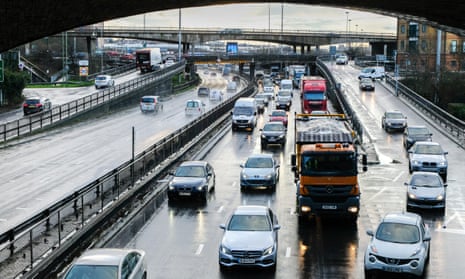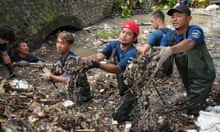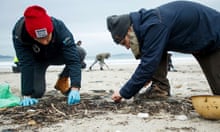The mayor of London, Sadiq Khan, has called on the government to provide more funding to clean up the pollution blighting London’s rivers, after a study highlighted the toxic effects on water from driving in the capital’s most congested areas.
The River Brent in west London and the River Lea in the east, at 18 miles and 42 miles respectively, are worst affected by pollution from roads. Concern over pollution has concentrated on toxic air, which is killing and shortening the lives of tens of thousands of people every year, but road pollution is also damaging the water supply.
Road runoff pollution in rivers and canals comes from spills of oil, diesel and petrol, and from the wearing of tyres and braking systems, which are left as residues that are then washed off the roads by rain and flushed into waterways. Road runoff pollution is one of the biggest sources of damage to London’s dozens of waterways, of which only one – the Carshalton Arm, source of the River Wandle – is classed as “good” under EU standards.
The new research, published on Monday, for the first time maps some of the biggest sources of road runoff pollution in the capital. They include the North Circular road at Alperton in west London and Chingford in the east, a slip road to the A40 at Ealing in west London, and Jenkins Lane in Beckton, east London.
One problem with preventing road runoff is that the sources of pollution are under the oversight of various government agencies and departments – the Environment Agency, the Highways Agency, the Department for Environment, Food and Rural Affairs (Defra), and the Department for Transport as well as local authorities. Most of these have faced severe budget cuts in the past decade.
Khan, the Labour mayor, said: “The government must step up to provide the Environment Agency and highways authorities with the appropriate funding for measures to properly protect the capital’s rivers.”
Hundreds of pollutants, including heavy metals, are routinely found in road runoff, and they can kill fish or other aquatic life and cause long-term damage to rivers – and potentially to human health, as they can affect drinking water sources, which must be extensively tested and expensively cleaned up if pollutants are found to be present.
However, by improving drainage before water treatment is needed, and providing natural barriers and filters, some of the road runoff pollution can be prevented from reaching the waterways in the first place. Planting suitable vegetation near waterways can filter out some of the pollution, as can creating or expanding natural wetlands. These also provide homes for wildlife and can help clear air pollution from road traffic.
John Bryden, the head of improving rivers at Thames21, one of the groups behind the new research and maps, said: “Pollution from roads is one of the least understood and most complex forms of river pollution. This research can finally help us identify the worst roads and start taking action to deal with this urgent problem.”
Moving to electric vehicles will help to cut down on some of the worst sources of road runoff, but toxins from tyre wear and braking systems will remain a problem. More and better public transport can cut traffic, and encouraging people to walk and cycle more will also play a key role.
Rob Shore, the head of UK programmes at the Wildfowl and Wetlands Trust charity, which manages some of London’s remaining wetland areas, said the problem was not confined to London.
“It is clear that road runoff is a major source of river pollution across the UK, especially in our urban areas, killing aquatic life and making our towns and cities less hospitable for people,” he said. “Wetlands and sustainable drainage systems [are] a key part of the solution. Creating new urban wetlands will capture runoff before it gets into our rivers, while providing a range of other benefits, such as flood alleviation, wildlife habitat and improvements to air quality.”
A Defra spokesperson said: “Improving our environment takes time, money and the combined effort of government, industry, businesses and civil society. We actively support this, bringing organisations together to tackle difficult issues like road runoff.”









